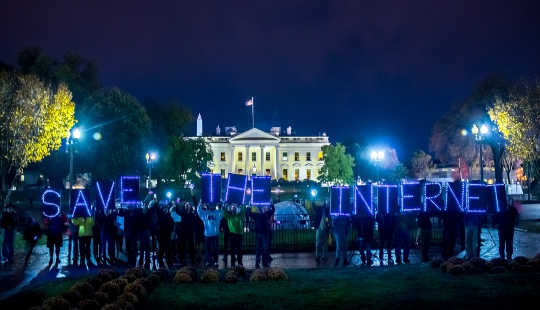
"Zero-rating is anti-competitive, bad for consumers, and harms innovation in our digital economy," says Josh Tabish of OpenMedia. (Photo: Joseph Gruber/flickr/cc)
Ruling against 'zero-rating' prevents 'Big Telecom from exploiting data caps to pick and choose winners and losers online'
As the Trump administration moves to gut net neutrality, Canada has just taken a step in the opposite direction, strengthening the practice of making all Internet traffic treated equally.
The Canadian Radio-television and Telecommunications Commission (CRTC), which regulates broadcasting and telecommunications, issued a new framework Thursday, and "ruled against a carrier offering 'free' music streaming as part of a zero-rating scheme," as technology news website Engadget explains.
CBC writes that the
decision stems from a 2015 complaint against the wireless carrier Videotron, which primarily operates in Quebec. Videotron launched a feature in August of that year, enabling customers to stream music from services such as Spotify and Google Play Music without it counting against a monthly data cap as a way to entice people to subscribe to Videotron's internet service.
Open internet advocacy groups have warned of risks of such zero-rating schemes. The Electronic Frontier Foundation, for one, has said they can provide an unfair advantage to the content that is zero-rated, disincentivize users from experiencing non-zero-rated parts of the net, and can turn Internet Service Providers (ISPs) into gatekeepers.
Speaking to those concerns, Jean-Pierre Blais, chairman and CEO of the CRTC, declared Thursday: "A free and open internet gives everyone a fair chance to innovate and for a vast array of content to be discovered by consumers. A free and open internet also allows citizens to be informed and engage on issues of public concern without undue or inappropriate interference by those who operate those networks. Rather than offering its subscribers selected content at different data usage prices, Internet Service Providers should be offering more data at lower prices. That way, subscribers can choose for themselves what content they want to consume."
Reuters notes: "The CRTC did not issue a blanket ban, however, instead saying it would rule on a case-by-case basis on whether such arrangements provide 'undue or unreasonable' preference." Still, the "ruling is still a very positive step in the right direction," according to Josh Tabish, campaigns director with the Vancouver-based organization OpenMedia.
"Zero-rating is anti-competitive, bad for consumers, and harms innovation in our digital economy. While Canadians still want to see data caps abolished, we are pleased to see the CRTC plant a flag that will prevent Big Telecom from exploiting data caps to pick and choose winners and losers online," he continues.
"This will ensure ISPs are unable to act as gatekeepers, and shows Canada continues to be a global leader on net neutrality. With the U.S. having just backed away from its own investigation into zero-rating, and the future of its net neutrality rules hanging in the balance, Canada looks like an increasingly attractive place to foster innovation online," Tabish writes.
Michael Geist, Canada Research Chair in internet and E-commerce law at the University of Ottawa, similarly applauded the CRTC's decision as "a huge win for net neutrality in Canada."
This article originally appeared on Common Dreams
About The Author
Andrea Germanos is senior editor and a staff writer at Common Dreams.
Related Books
at InnerSelf Market and Amazon

























